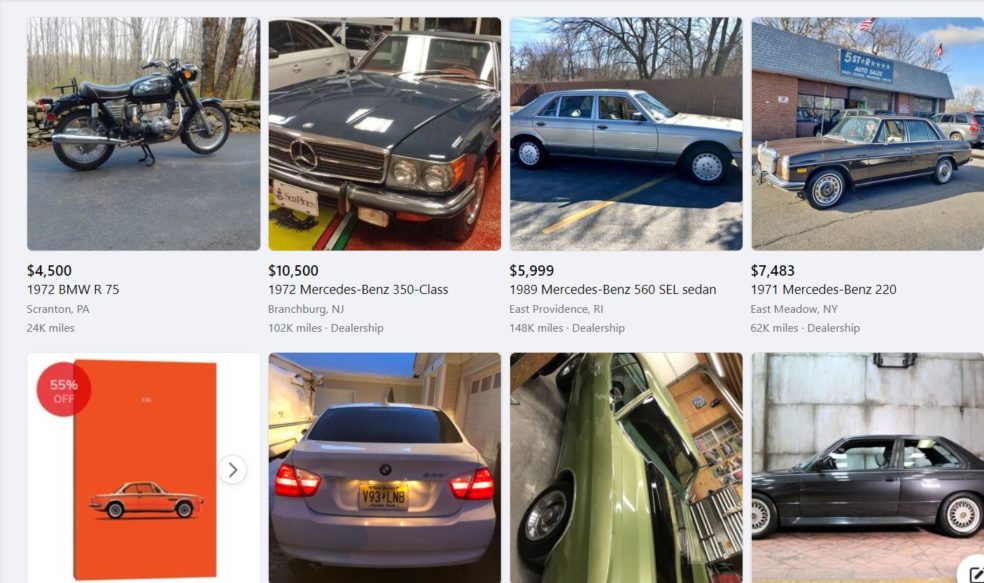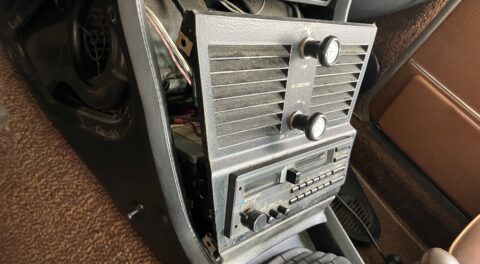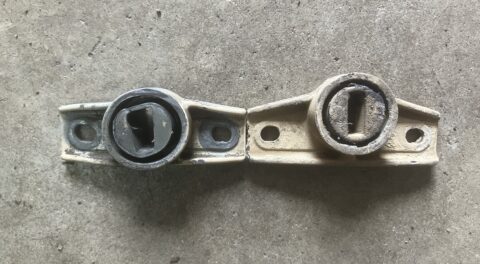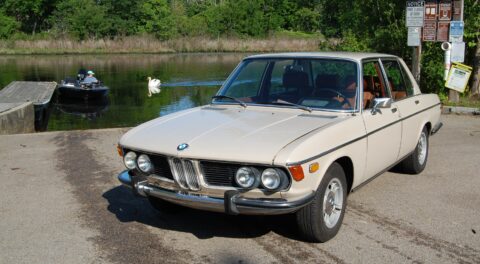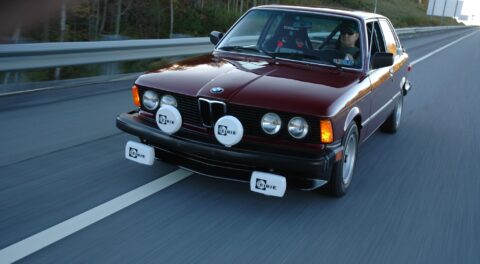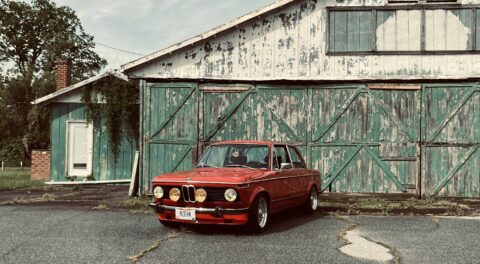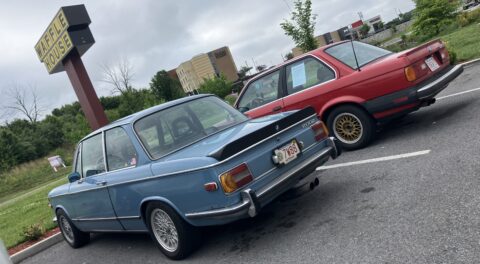The evolutionary biologist Stephen Jay Gould wrote about “punctuated equilibrium,” the tendency for biological systems to stay the same for long periods of time, then to change rapidly in response to environmental stress. I’ve always felt that this model applies really well to what goes in my garage. Projects may sit for months or years, and then, BOOM! There’s remarkable progress over a span of weeks.
Such was the case with Zelda, the 1999 Z3 that I bought back from my friend Kim a few months ago after her son put it up on a median strip. I repaired the curb-strike damage, then replaced a disintegrated clutch throwout bearing. For a few weeks, I was sore, but insufferably pleased with myself.
The next step with Zelda is to replace the fractured front bumper cover (air dam), but I don’t want to remove it until I have another one in my hands, and I don’t want to buy a new one because I have no place to paint it until spring, so I’m vulturing to see if I can find a used Boston Green bumper cover. In the meantime, Zelda, the Lotus, and Hampton the 48,000-mile 2002 sit sardine-like in the garage.
Then winter fell—with a vengeance. (To be clear, with the current situation where people in Texas really are freezing, I’ve had heat and electricity; we’re just talking about the trivial issue of accessing cars in the garage, and I’m not complaining.)
While winter is hard on everyone’s automotive endeavors, there’s a particular dynamic at my place that settles in with the snow. While it is not impossible to get cars in and out and swap them with the rest of the stablemates stored out in Fitchburg, I’d really need to make a lawyer’s case to do so, given the salting of the roads. Sure, some years there are long, snowless stretches where it’s a non-issue, but the snowy winter, combined with my falling and smacking my forehead and then not blowing out my driveway for a week, really kind of froze everything in place.

You can see where we shoveled only the top-most section of the driveway. The remaining snow then froze into a block of ice, and it’s not going anywhere anytime soon.
Plus, I live on a dead-end street. The neighbor to the left of me complained to the city that they weren’t doing a good job plowing it, so in response they dumped so much salt that I can hear my cars screaming all the way out in Fitchburg.

Ouch!
For all these reasons, I find myself doing what so many of us do for cabin-fever recreation: pounding on the Interwebs and looking at cars, even though I have no place out of the weather to put another one, and at this moment couldn’t even drop another one in my driveway.
I referred to all this last week when I mentioned that a very interesting ad for an engineless E30 325is popped up on Facebook Marketplace in Connecticut. It was the kind of ad for which I’d normally drop everything, but with the recent head wound, the two snowstorms, the driveway full of snow, the lack of any available space either inside or outside, and the fact that I no longer even own a tow vehicle, I was slow out of the gate, and a day later, the status had changed to “Sale Pending,” as I knew it would. So, this being a slow week, I thought I’d take a moment and talk a bit more about the pros and cons of Facebook Marketplace.
As I wrote in the January Roundel, I’m not really a big fan of Bring a Trailer. I don’t use it to recreationally car-porn browse, as a lot of other people do, and for a guy like me who looks for deals, it’s a site where there are very few to be found. Quite the contrary, there seems to be a “more is better” bid-up dynamic, where the folks doing the bidding pay to provide entertainment for the folks watching the auction, and that’s totally not my thing as either a buyer or a spectator.
That leaves eBay, Craigslist, and FBM (yes, I know there are other collector car sales/auction sites—Hemmings, for example—but again, I’m a bottom-feeder). eBay, obviously, is an auction site, but unlike Bring a Trailer, its auctions are not “curated,” so anyone can list whatever car they have in whatever condition it’s in, creating at least the possibility that I might see value where others don’t. I am, however, extremely risk-averse, and don’t believe anyone except my own eyes or a handful of experienced friends, so a car has to be extremely well-described and photographed in order for me to bid on it on eBay (that is, I’d basically need to have written the ad myself). Plus, shipping adds substantially to a car’s purchase cost. So, for risk-averse me, that leaves the local-centric options of Craigslist, and the newer kid on the block, Facebook Marketplace (FBM).
Craigslist, of course, has been around nearly as long as the World Wide Web itself. The interface is simple, clean, and easy to use. The search is a simple keyword match. For example, you can type in, “BMW 2002tii” and it’ll search for exactly what you’ve typed, showing you any BMW 2002tii’s it finds, and missing something if it was listed with a space between “2002” and “tii.” You can choose whether to search in the titles only or in the body of the ad descriptions as well, and with one click you can shut off the display of ads from dealers.
Individual sites are based in metropolitan areas (e.g., boston.craigslist.com), but tools such as SearchTempest allow you to search nationally (although the farther from home a car is, the more you run into the problem of not being able to see it in person). But unfortunately, these days the volume of car listings on Craigslist appears to be a fraction of its former self, since for better or worse (mostly worse), many folks have gravitated to FBM.
FBM was first released in 2016 and took a while to get traction. It has some glaring negatives, but there are a few handy features. And more to the point, these days it’s a fruitful place to search.
Those negatives, however, are substantial.
FBM’s search engine is just awful—really, stunningly horrible, considering the resources of the digital real estate it’s attached to. For starters, on FBM, unlike Craigslist, there is no option to choose between search titles only or full ad descriptions, or to display only private-sale ads. But it’s the search engine itself that’s just unforgivably wonky. Type “BMW 2002tii” and it shows you what it thinks might be related. This might include late-model BMWs, Mercedes, a Chevy, and a tractor; and astoundingly, it may miss an actual 2002tii. And that goes not only for cars, but for other things I search for: musical instruments, Recaro seats, etc. It might find them. It might not. But it nearly always fills the page with posts that it thinks are somehow related. What you’re looking for might at the top, it might be 2/3 of the way down, or it might not be there at all.
Because the search pulls in so much garbage, doing what bargain-hunters do—sorting by price—is useless. The photo at the top of the article was an actual search for “1972 BMW.” Below are actual searches for “2002tii.” It really is astonishingly bad.
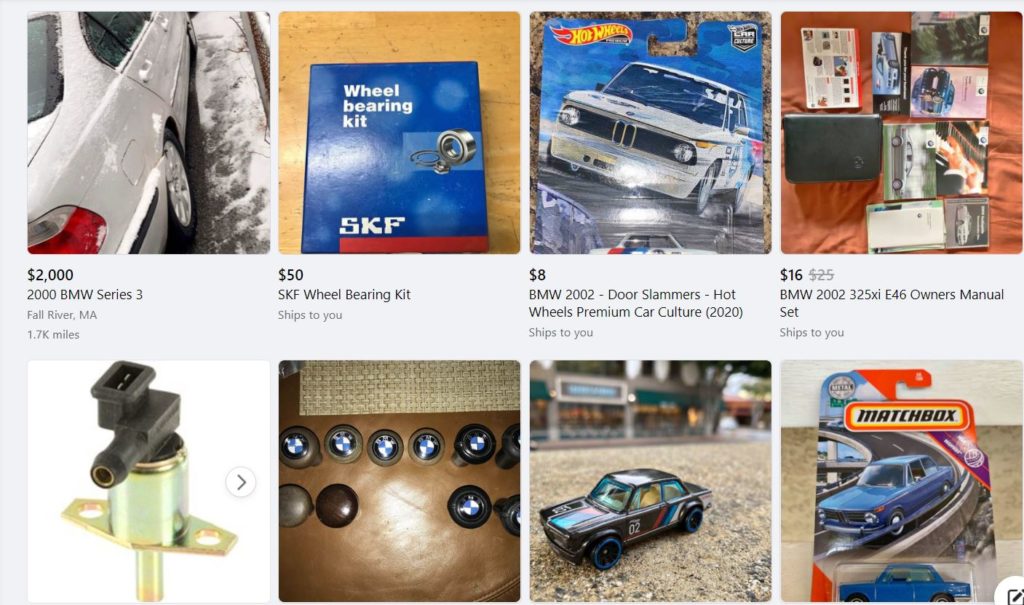
Page 1 of FBM “2002tii” search. Yes I see the ad for the aftermarket cold start valve.
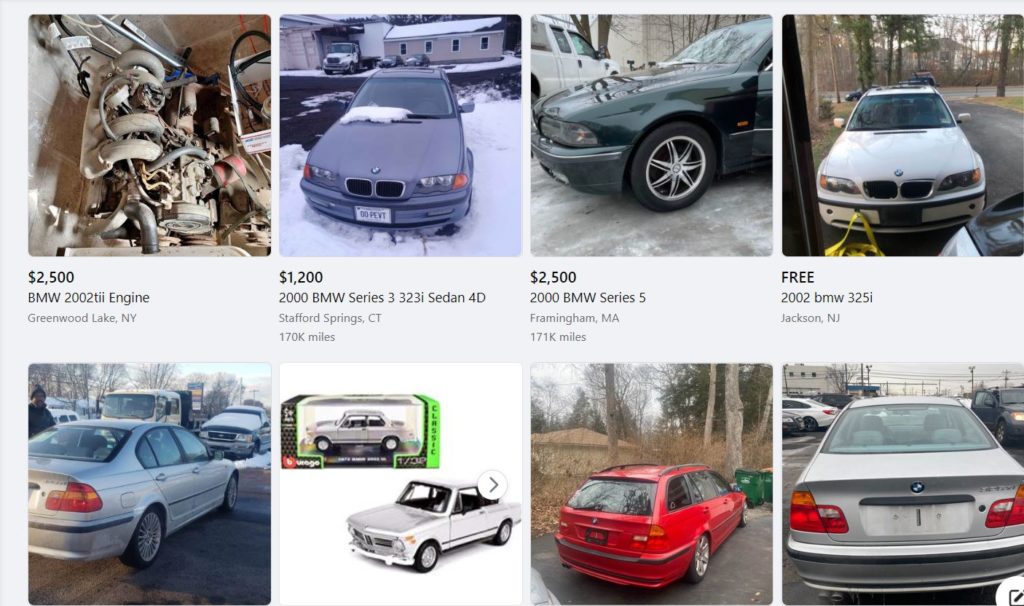
Three pages in, there’s something that actually has 2002tii in the title: someone selling a used engine.
Closely related to the poor search engine is the problem of clutter, which seems to get worse every week. You can set a default search radius, but in addition to that, FBM has an option for “delivery method.” It comes up set to “all,” meaning both local pickup and shipping, which means that the $250 Recaro seats folks are selling cheaply to get them out of their basement—which, admit it, is what you’re looking for—compete for space with the paid-for nationwide ads for Recaro baby seats. Further, FBM increasingly displays not only things that are listed for sale in FBM, but also things that are listed nationally in Facebook groups. On the one hand, this may be helpful if you’re trying to find some rare item, but it gets in the way of bargain-hunting if you’re looking for drive-by-here’s-the-cash items.
Since the FBM search engine doesn’t perform a straight keyword search for what you type, it won’t surprise you that you can’t do the kind of complex keyword-and-excluded-terms searches many of us are used to doing on Craigslist and SearchTempest. That is, to find the elusive rear-wheel-drive BMW wagon, I use “bmw wagon -325xi -325xit -328xi -328xit -530xi -530xit.” That simply doesn’t work in FBM. Further, even though, like Craigslist, FBM has a field to select “transmission type,” for some reason it’s frequently wrong; setting it to “manual” excludes cars whose photos plainly show a stick.
Here’s my pro tip: If you’re looking for a specific make and model car, instead of a text search, you can use FBM’s database capabilities and click on “vehicles,” then “make,” then select the model. I don’t do that. Instead, I’ll usually select “BMW,” then, instead of selecting a model, under “sort by,” I’ll select “year: oldest first” and look that way. Of course, if you do this, it may inexplicably miss cars it finds with a keyword search. (Did I mention that it’s horrible?)
For old or rare cars, models and their pricing can be mis-listed, as FBM doesn’t have every make and model in its database, requiring folks with obscure cars to list them as something else (for example, it doesn’t know what a 1963 Studebaker Avanti is, so they’re sometimes listed instead as Corvettes). Further, if you’re selling a car, FBM will look up its value in Kelly Blue Book, and won’t allow you enter a sale price higher than KBB value. As most of us have experienced, KBB prices often lag behind market values of collector cars. This forces people to use the ridiculous practice of entering numbers like $1,234 for the vehicle price.
But there are some pluses to FBM. One is that, to no one’s surprise, there are algorithms running beneath the surface, so search a few times for old BMW and Guild guitars and it begins to learn what you’re looking for and will show you similar things when you next look. Also, if you search for, say “Triumph GT6” (not that I ever would!), it seems to know, Amazon-style, that folks who enjoyed that kind of pain might enjoy this kind of pain, and will show you other Lucas-wired goodies.
Similarly, in my search for a well-equipped 1963 Rambler Ambassador with factory air and power everything, it will also lead me down the path of other interesting American iron with beautiful early-’60s dashboards. Note, however, that this is counterbalanced by the ever-increasing amount of commercial sales on FBM, and the ridiculous scam ads that their algorithms could screen out easily if they wanted to (you know, the same $1,500 Airstream trailer showing up at four different dealerships).
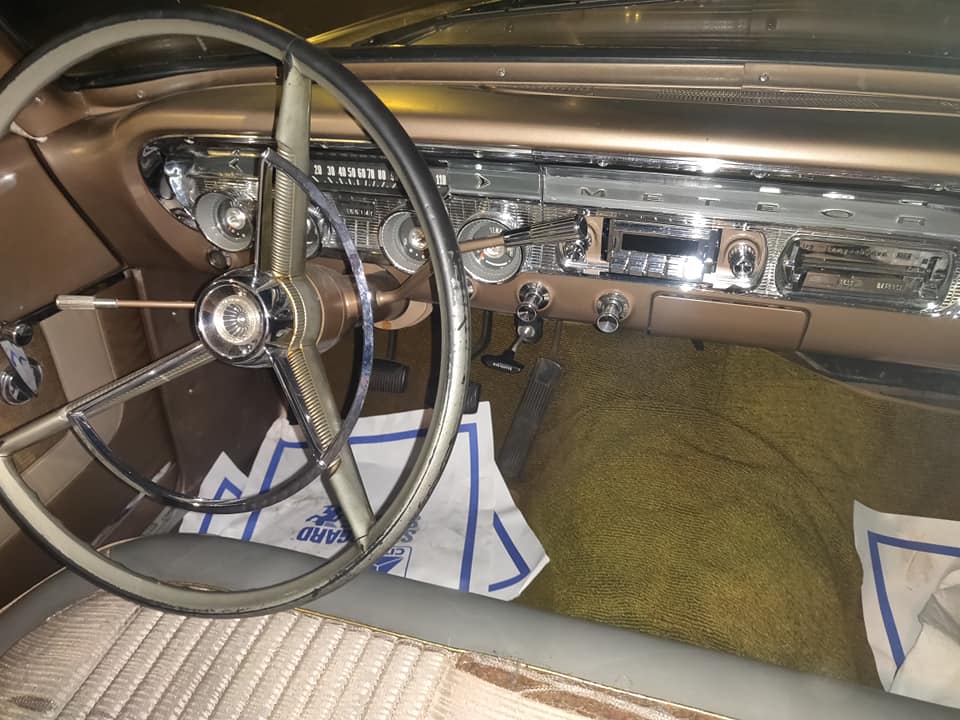
I wasn’t searching for a ’62 Mercury Meteor, but… hubba hubba!
Another nice thing about FBM is that since it’s part of Facebook, you can click on the seller, see their profile, see how buyers have rated them, and see what else they’re selling. And if you want to inquire about an item, the messages are part of Facebook, so you don’t need to let your cell number leak out into the world. And in one of the most useful features of all, if you’ve saved the listing in Facebook or communicated with the seller, you’ll receive a message if the price has been lowered or the item has been sold.
Some folks like the fact that the Facebook phone app allows direct access to FBM both from the ad-writing and the ad-searching standpoint, allowing you to snap pics on your phone and quickly post an item for sale (Craigslist was very slow in coming up with an app). Personally, with my propensity for writing long, descriptive ads, I far prefer to take the photos, load them on my laptop, and compose the ad there, but I understand how others might feel different. As far as using FBM on the phone to search, I’ve found it so buggy as to be nearly unusable, but these things tend to improve with time.
So: I don’t like FBM, but it’s increasingly a part of my bargain-hunting world. But when you see the ad for the cherry 1988 E30 325is, don’t get too excited. Trust me, the price isn’t really $1,234.—Rob Siegel
Rob’s latest book, The Lotus Chronicles: One man’s sordid tale of passion and madness resurrecting a 40-year-dead Lotus Europa Twin Cam Special, is now available here on Amazon. Signed copies of this and his other books can be ordered directly from Rob here.

